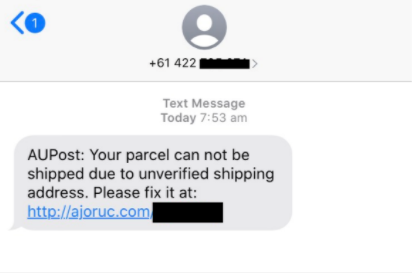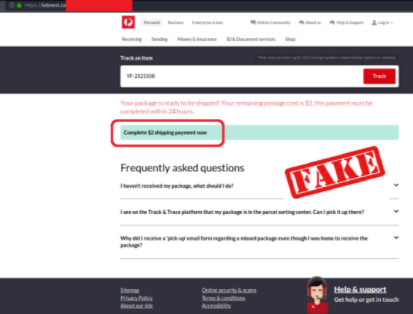Scammers continue to find ways to trick you into providing your personal details, as highlighted during Scams Awareness Week. We have recently been advised of the following phishing scams, which could affect you, your family or your friends.
Scams targeting Australia Post customers
You may receive a phone call or email from someone pretending to be from Australia Post. The caller or email advises that Australia Post has a small refund for you and will request your credit card details in order to process the refund.
Should you receive one of these phone calls or emails, please do not provide your credit card details. It is a scam, so either hang up the call or delete the email. Do not click on any links or supply any personal details.
Another Australia Post scam that has been circulating during August involves fraudulent text messages advising you of a delivery update and prompting you to click on a link to verify the address. The link will lead to a fake Australia Post website that has been designed to steal your personal and financial information.
Here's an example of the text message:

Here’s an example of a fake Australia Post website:

Please treat this text message the same way as you would treat any suspicious emails, simply delete it immediately. Do not click on any links contained in the text or supply any personal information. Kindly note that Australia Post will never email or text message you to ask for personal information, financial information or a payment.
To find out more about scams targeting Australia Post customers, please visit Scam alerts on the Australia Post website.
Scams targeting PayPal customers
If you use PayPal, please be alert for scam emails with a subject line such as Suspicious Activity on Your Account or Your account has been limited. These emails will advise that your account information has been changed and therefore your account has been limited. Such emails will request that you log in via a supplied link to update your personal information. The email may try to pressure you into supplying information by threatening to lock your account if you have not updated your details by a specified deadline.
Should you receive one of these emails, please delete it. Do not click on any links contained in the email or supply any personal information.
Below is an example of the scam email:

Need help?
If you believe someone has gained access to your personal information, even if the scam appears unrelated to your finances, you should contact your bank immediately. A timely response can be critical in giving you the best chance to stem any loss.
- If you have concerns about your G&C Mutual Bank account contact us on 1300 364 400.
- You can find out how scams work, how to protect yourself, what to do if you’ve been scammed or report a scam to the Australian Competition and Consumer Commission (ACCC) via the Scamwatch website scamwatch.gov.au.




